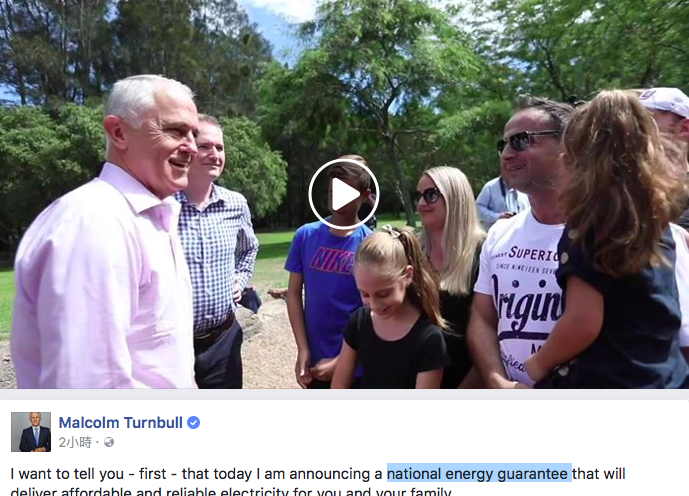While details are still sparse, the Coalition Federal Government, led by Malcolm Turnbull has turned away from deploying a Clean Energy Target. It has opted what it is calling a National Energy Guarantee (NEG) system, to be put into place once the existing Renewable Energy Target mechanism comes to an end in 2020. A new market regime for post-2020 had long been requested from market participants, to deliver investment security.
The Prime Minister and Energy Minister Josh Frydenberg are expected to provide more details as to the NEG today. The key principles as initially communicated are:
- An energy intensity calculation will be employed, and electricity retailers forced to source some of their power from that is sufficiently efficient – to allow Australia to meet its Paris climate commitments;
- The NEG will place an additional requirement that utilities have a minimum amount of dispatchable power available, to ensure security.
In a video announcing the NEG, Prime Minister Turnbull said that the system includes no subsidies, no certificates, and no tax. The policy, he said, will guarantee reliability and emissions reductions, while providing – desperately needed – certainty for investors.
Just how the NEG could do these things, and reduce pressure on rising power prices, is unclear. It is also unclear what kind of enforcement mechanism will be used to ensure both the energy intensity and dispatchability measures.
However, Turnbull is clearly hoping that he has found a middle ground through opposition to the Clean Energy Target (CET) from the right of his own party, and the need to produce a policy mechanism by which investment in new generation occurs and emissions are reduced.
“This is a significant breakthrough,” said Turnbull. He said he hoped the NEG will bring to an end the “climate wars”, which have hamstrung Australia’s energy policy in recent years.
Climate warrior number one, former Prime Minister Tony Abbott tweeted that the defeat of the CET was “progress”.
The NEG was approved by the government’s party room meeting today. It will need the cooperation of the state energy ministers for implementation.
Various state governments have already shown their willingness to step into the energy policy void previously left by the federal government’s self-induced paralysis, with Queensland and Victoria both moving forward with plans for large scale renewable auctions, of which security of supply – through storage – is playing a significant.
This content is protected by copyright and may not be reused. If you want to cooperate with us and would like to reuse some of our content, please contact: editors@pv-magazine.com.










By submitting this form you agree to pv magazine using your data for the purposes of publishing your comment.
Your personal data will only be disclosed or otherwise transmitted to third parties for the purposes of spam filtering or if this is necessary for technical maintenance of the website. Any other transfer to third parties will not take place unless this is justified on the basis of applicable data protection regulations or if pv magazine is legally obliged to do so.
You may revoke this consent at any time with effect for the future, in which case your personal data will be deleted immediately. Otherwise, your data will be deleted if pv magazine has processed your request or the purpose of data storage is fulfilled.
Further information on data privacy can be found in our Data Protection Policy.